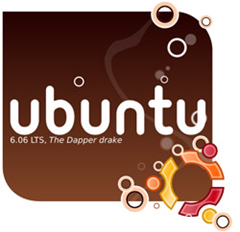$1 Billion Open Source and Google getting it…
I like Ubuntu because I like Debian. Debian, to me, always seemed more logical and software dependency resolution built into synaptic made life easier. RPM files made me pull my hair out.
 Hey, I never claimed to be a Linux guru, and I’ve tried to switch over to it on numerous occasion. In the world I live in right now, it’s Microsoft Windows and a flavor of BSD (aka OSX). All my Linux deployments are vertical in nature. For example, I have Ubuntu Server running in VMs as peer to peer VPN based routers. This gives me a layer 2 network “in the cloud” that I can connect any node or site to with zero firewall configuration (via NAT traversal). It’s handy, and I’ll blog about it someday if enough people care to know how I did it.
Hey, I never claimed to be a Linux guru, and I’ve tried to switch over to it on numerous occasion. In the world I live in right now, it’s Microsoft Windows and a flavor of BSD (aka OSX). All my Linux deployments are vertical in nature. For example, I have Ubuntu Server running in VMs as peer to peer VPN based routers. This gives me a layer 2 network “in the cloud” that I can connect any node or site to with zero firewall configuration (via NAT traversal). It’s handy, and I’ll blog about it someday if enough people care to know how I did it.
Either way, Linux isn’t going away; messy licensing and ignorant mid-level management aside. And if you doubt it, just look at Red Hat. Red Hat is poised to the first open source business to hit $1 billion in revenue. It’s fiscal 2011 revenues this week hit $909 million. Remember all the FUD about Linux in the world of IT? How it was insecure, hard to use, and just not ready for prime time? Well, that protected the status quo for a while, but those days are over.
Usage Identity
Ubuntu is an extremely user friendly Linux. Lots of effort has been put into it to make it support a wide array of hardware, to be visually pleasing, and to have it’s own what I like to call “usage identity”. Usage Identity is a phrase I use to speak about more than just the user experience. It’s about usage paradigms, expected behavior, and sense of quality.
If you’ve always wondered what all the fuss was about when it comes to Linux and you have an old computer, download Ubuntu, burn a CD or DVD, and install it. You may be surprised how much fun using a new operating system can be. What do you have to lose?
 Apple has an incredible usage identity, and they’ve had it for an inordinate amount of time. You can take the newly minted Mac user of today and sit them in front of an original Mac and they’ll find their way around. Apple’s tight control of their market is to maintain their Usage Identity at all costs. From pricing, to packaging, to support.
Apple has an incredible usage identity, and they’ve had it for an inordinate amount of time. You can take the newly minted Mac user of today and sit them in front of an original Mac and they’ll find their way around. Apple’s tight control of their market is to maintain their Usage Identity at all costs. From pricing, to packaging, to support.
Microsoft’s usage idenity is better than it used to be. They’re not making dramatic shifts like they did from 3.11 to 95. Since Windows 95, though, they’ve consistently improved their user experience. Considering the level of backwards compatibility they maintain and the size of their install base, it’s an absolute wonder what they accomplish sometimes. Say what you will, but there’s not another technology vendor on the planet that has to deal with such diverse environment.
From Glass House, to Desktop, to Hip
 I met the boys from Red Hat at a convention in L.A. many years ago when I was CTO of a dot bomb. Their enthusiasm was infectious and they were my first face to face encounter with a pure open source play. In my arrogance and ignorance, I didn’t take them seriously. Boy, did that teach me a lesson!
I met the boys from Red Hat at a convention in L.A. many years ago when I was CTO of a dot bomb. Their enthusiasm was infectious and they were my first face to face encounter with a pure open source play. In my arrogance and ignorance, I didn’t take them seriously. Boy, did that teach me a lesson!
Which brings me to Google.
Google, on the other hand, I view very differently. Don’t get me wrong, I have the highest respect and admiration for the Red Hat community; they’ve proven the IT Establishment wrong in heroic fashion. Google, though, is starting from an very different place. In fact, they’re somewhat standing on the shoulders of Red Hat.
 Google’s “Linux” is Android and I feel like history is repeating itself. We’re seeing all sorts of FUD about the open source nature of Android’s Linux roots. Additionally, Android, is lagging when it comes to user experience. An Android phone is widely perceived to have a lessor usage identity than an iPhone (correctly or incorrectly).
Google’s “Linux” is Android and I feel like history is repeating itself. We’re seeing all sorts of FUD about the open source nature of Android’s Linux roots. Additionally, Android, is lagging when it comes to user experience. An Android phone is widely perceived to have a lessor usage identity than an iPhone (correctly or incorrectly).
Google, though, has vast resources and nobody said Google was stupid (well, almost nobody). With Motorola saying Google is shooting Android in the foot, and Apple drawing a line in the sand when it comes to user experience, I felt like something was going to change, and I was right.
Google said they’re going to hold off releasing the source code to Honeycomb for now. The open source purists may howl, but I think this is good for the Android ecosystem. I love previewing stuff as much as the next guy, and we know Google will release the source code.
Google is holding off releasing the source code because it’ll get compiled and put on phones before it’s polished. Google wants to people to have a great user experience when they use Honeycomb. Getting access to nightly builds has been both the great thing about open source and one of the biggest Achilles heels of when it comes to competing with closed source. By not waiting until a product was truly ready for prime time, open source products have blown their one chance to make a great first impression in many cases.
So hopefully, the open source community will simmer down, and sit tight; because Google is playing it smart, folks. Damn smart. I hope the Android hackers will turn their collective energy from bitching to maybe helping evangelize or improving the platform. Honeycomb has to raise the bar over Apple’s stellar iOS if they’re going to truly instill droid envy in their competitor’s customers.